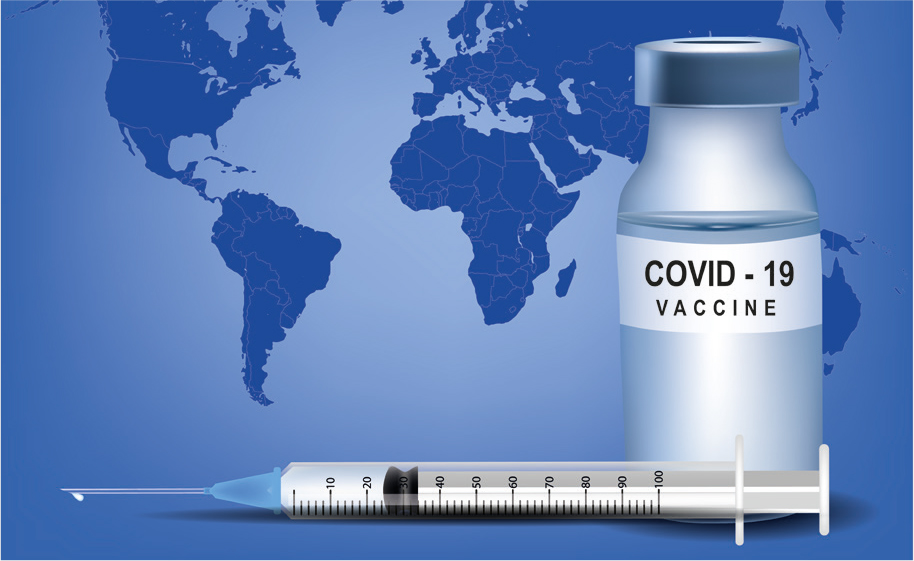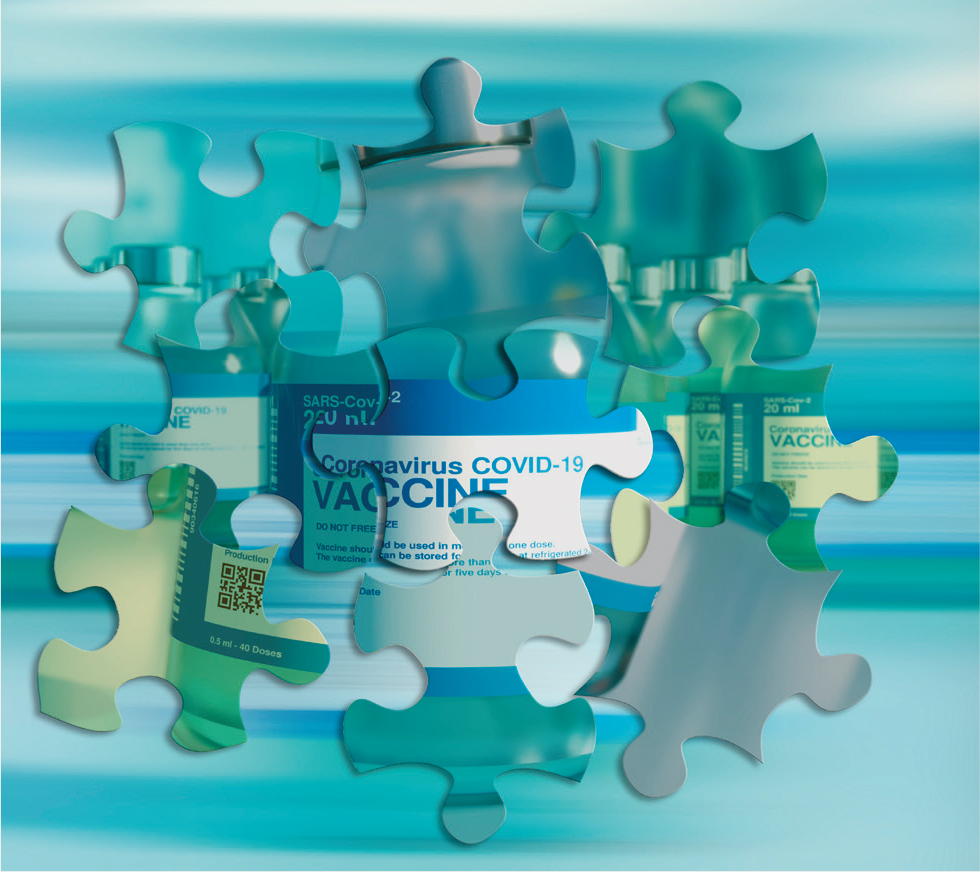We need a people’s vaccine
As vaccine nationalism and inequitable distribution continue to plague the global rollout of COVID-19 vaccines, epidemiologists from leading academic institutes around world have issued a stark warning that so-called ‘variants of concern’ to SARS-CoV-2, the virus that causes COVID-19, could render current vaccines ineffective in less than a year. Callan Emery reports.
The People’s Vaccine Alliance – a coalition of more than 50 organisations including UNAIDS, African Alliance, Oxfam and Public Citizen – issued the warning on 30 March following a survey of infectious disease specialists from 28 countries conducted by the Alliance. Of the 77 epidemiologists and virologists surveyed, two-thirds thought that within a year or less the virus will mutate to the extent that the majority of first-generation vaccines are rendered ineffective and new or modified vaccines are required. Of those surveyed, almost a third gave a timeframe of nine months or less. Fewer than one in eight said they believed that mutations would not render the current vaccines ineffective.
The overwhelming majority of those surveyed – 88 per cent – said that persistent low vaccine coverage in many countries would make it more likely for vaccine resistant mutations to appear.
Nearly three-quarters of those surveyed – from institutions such as Johns Hopkins, Yale, Imperial College, London School of Hygiene and Tropical Medicine, Cambridge University, the University of Edinburgh and The University of Cape Town – said that open sharing of technology and Intellectual Property could increase global vaccine coverage.
This follows calls from various sectors – governments, advocacy groups, researchers, religious leaders and academics – for big pharma to share their Intellectual Property for their COVID-19 vaccines and related technology which, they say, will make a significant impact on speeding up the production and subsequently the vaccination of people in low and middle income countries.
Winnie Byanyima, Executive Director UNAIDS, said: “Amid so much personal selflessness, sacrifice and heroism, the People’s Vaccine Alliance denounces the hypocrisy, emptiness of human solidarity and myopic self-interest that defeats efforts to control the virus in countries. Only a truly global mobilization of vaccine production to rapidly scale-up the total number of low-cost doses available will get the job done.”
Devi Sridhar, Professor of Global Public Health at the University of Edinburgh, pointed out: “The more the virus circulates, the more likely it is that mutations and variants will emerge, which could make our current vaccines ineffective. At the same time, poor countries are being left behind without vaccines.
“As we’ve learned, viruses don’t care about borders. We have to vaccinate as many people as possible, everywhere in the world, as quickly as possible.”
Dr Mohga Kamal Yanni, Senior Health Policy Advisor to The People’s Vaccine Alliance, added: “If we were in a war with a country called COVID, would governments leave vital decisions on production, supply and price in the hands of arms producing companies?
“Given vaccines are our most crucial weapon in the fight against COVID-19, world leaders must take control to enable the World Health Organisation’s COVID Technology Access Pool to facilitate sharing of technology and Intellectual Property so that all capable companies can maximise global vaccine production.”
No Man is an Island
“No man is an island entire of itself; every man is a piece of the continent, a part of the main; if a clod be washed away by the sea, Europe is the less, as well as if a promontory were, as well as any manner of thy friends or of thine own were; any man’s death diminishes me, because I am involved in mankind. And therefore never send to know for whom the bell tolls; it tolls for thee.”
– John Donne
The economic rationale
If big pharma and the Advanced Economies cannot be persuaded on moral grounds, perhaps an economic rationale will work. A recent study [1] by the US-based National Bureau of Economic Research shows that the global GDP loss of not inoculating all the countries is higher than the cost of manufacturing and distributing vaccines globally. The authors demonstrate the importance of making the vaccine globally available, not from a moral standpoint – although this is clearly a moral and humanitarian issue – but from an economic one, by illustrating the large economic costs in the absence of global vaccinations.
The researchers show that Advanced Economies may bear somewhere from 13 to 49 percent of the global losses – up to an estimated US$9 trillion, according to Brookings [2] – arising from an inequitable distribution of vaccines in 2021, even if they achieve universal vaccination in their own countries. This range corresponds to 0.3 to 3.7 percent of their 2019 GDPs and is far larger than the US$27.2 billion cost of manufacturing and distributing vaccines globally as estimated by the Access to COVID-19 Tools (ACT) Accelerator Partnership.
The authors note: “Ironically, a significant portion of these [global] costs will be borne by the advanced countries, despite the fact that they might vaccinate most of their citizens by the summer of 2021. This is because Advanced Economies (AEs) are tightly connected to unvaccinated trading partners which consist of a large number of Emerging Markets and Developing Economies (EMDEs). Thus, the devastating economic conditions in these countries under the ongoing pandemic can cause a non-negligible drag on the AEs as well. Even though AEs relative costs are less than that of EMDEs as a percentage of their GDPs, their larger sizes imply that they bear a large fraction of the total global costs.”
The authors conclude: “To minimize these economic costs of the pandemic, a globally coordinated push for the production and the distribution of the COVID-19 vaccine is required. EMDEs have more at stake if the delivery of effective vaccines is delayed. Nevertheless, our analysis shows that AEs have strong economic incentives to eliminate the pandemic at their trade partners in order to achieve a faster recovery at home. Globalization might have amplified the effects of the pandemic but it is also imperative for an equitable distribution of the vaccines because this is the only way for open economies with international linkages to have a robust recovery.”
Profiteering at what cost?
It is clear that SARS-CoV-2 variants of concern will continue to evolve and increase in number as long as the virus is left to circulate. These future variants could potentially be more transmissible, more lethal and render current vaccines ineffective – to the point where even vaccinated individuals could be re-infected, potentially by a more lethal variant. Early research is already indicating this outcome (see accompanying article: SARS-CoV-2 variants from mink can reinfect humans and evade inhibition by antibodies.
The repercussions of not rapidly co-ordinating a global response to the vaccine rollout are manifold, not least to the on-going global economic fallout, much of which will be borne by the advanced economies who are currently hoarding vaccine supplies (see accompanying article: COVID vaccines: rich countries have bought more than they need – here’s how they could be redistributed).
This begs the question, why isn’t there a more urgent, concerted global collaborative effort to vaccinate as many people as possible as quickly as possible.
The World Health Organisation (WHO) and its partners have established mechanisms in an attempt to facilitate this. Last year the WHO set up the Access to COVID-19 Tools Accelerator Partnership (ACT Accelerator), which includes an initiative to enable the sharing of Intellectual Property and related technologies with regards the vaccine, but not a single pharma company signed up.
The WHO and partners also established the COVID-19 Vaccine Global Access Facility also known as COVAX, which is acquiring vaccines for low- and middle-income countries (LMICs) through donor funding contributions. But even this largely philanthropical initiative will only be sufficient to vaccinate not more than 20 per cent of these countries’ populations – insufficient to develop herd immunity. It is also currently facing a $2 billion shortfall to acquire the vaccines to achieve this aim.
Clearly it is in the best interests of the governments of these advanced economies to force the issue – if not on moral grounds then on economic reasoning. They have the capacity to do this. This will ensure that big pharma share their Intellectual Property and technical know-how with manufacturers in developing economies to facilitate the more rapid production and distribution of COVID-19 vaccines.
Speaking to The New York Times [3], Christopher J. Morten, a New York University law professor specializing in medical patents, said the Biden administration has the leverage to force companies to share technology and expand worldwide production. However, despite immense government funding for these pharma companies to develop COVID-19 vaccines, both the US and the EU refuse to do this, arguing that by protecting the Intellectual Property of these companies they facilitate innovation.
The drug companies also argue that finding partners with the right technology is demanding. According to The New York Times, Moderna’s chief executive, Stephane Bancel, told European lawmakers that, “they don’t have the equipment. There is no capacity.” But this is not the case. Several countries, such as Bangladesh and Canada, have issued statements [4, 5] saying they do have the capacity but require emergency patent-transfer so they can begin manufacturing the vaccine.
Intellectual Property Rights
In October South Africa and India called for the World Trade Organization to suspend Intellectual Property rights related to COVID-19 [6]. Specifically, they called “for a waiver from the implementation, application, and enforcement of the intellectual property rights of products and their underlying technologies for prevention, containment, or treatment of COVID-19, until widespread vaccination is in place globally, and the majority of the world population has developed an immunity”.
Dozens of LMICs support the proposal, but pharma companies and several advanced economies in the WTO including the UK, USA, Japan and the EU opposed the initiative, saying that the Intellectual Property system is required to incentivise new inventions of vaccines.
The proposal states that Intellectual Property rights such as patents are obstructing affordable COVID-19 medical products. A temporary waiver would allow multiple actors to start production sooner, instead of having manufacturing concentrated in the hands of a small number of patent holders.
“What this waiver proposal does is it opens space for further collaboration, for the transfer of technology and for more producers to come in to ensure that we have scalability in a much shorter period of time,” Mustaqeem De Gama, counsellor at the South African Permanent Mission to the WTO, who helped write the proposal, is quoted as saying [6].
There are provisions within the World Trade Organization (WTO) Agreement on Trade-Related Aspects of Intellectual Property Rights (TRIPS) to facilitate this. Specifically, paragraph 7 of the Doha Declaration, adopted at the Fourth WTO Ministerial Conference in Doha, Qatar, on 14 November 2001, reaffirms “the commitment of developed-country WTO members to provide incentives to their enterprises and institutions in order to promote and encourage technology transfer to Less Developed County (LDC) members, as set out under Article 66.2 of the TRIPS Agreement, thus confirming that technology transfer to LDCs is also a public health issue”.
A recent research paper published in March by the South Centre [7], notes that data analysis carried out by the Coalition for Epidemic Preparedness Innovations (CEPI) estimates that only in 2024 will there be the production of the vaccines necessary to generate global immunization. The paper, which looks in detail at the impact that intellectual property rights will have on production capacity and the availability of technologies to respond to the pandemic, concludes that “the current TRIPS waiver proposal seems to be the political and institutional response with the greatest potential to guarantee the scaling of the production of pharmaceutical inputs, allowing the adoption of a comprehensive strategy to ensure timely, sufficient, and affordable access to all technologies developed to fight COVID-19”.
On 9 March this year the WTO Director-General, Ngozi Okonjo- Iweala, called on COVID-19 vaccine manufacturers to do more to ramp up production in developing countries.
She told the Global C19 Vaccine Supply Chain and Manufacturing Summit that the scarcity of COVID-19 vaccine supplies had led to a situation in which around 75 countries are able to move ahead with vaccination while 115 countries wait as people die. Not only was this morally “unconscionable” she said, it would prolong the pandemic and cause economic harm to all countries. Instead of restricting exports and bidding up prices, she said, “it is in all of our self-interest to cooperate in dealing with this problem of the global commons”.
She expressed hope that it would be possible for manufacturers from developed and developing countries to come together with civil society groups, organizations such as the World Health Organization, Gavi, and the Coalition for Epidemic Preparedness (which together run the COVAX facility), and business associations including the International Chamber of Commerce to find ways to increase vaccine production.
Nobel Laureate Professor Muhammad Yunus, one of the leaders of the People’s Vaccine Alliance noted: “For the rich world, this proposed act of human solidarity to ensure that medicines and vaccines get to the whole human family simultaneously is in their own self-interest, not just an act of charity.
“We should act now. There is no going back. It is totally unfair that rich countries, who have enough vaccines to protect their citizens, are blocking the TRIPS waiver, which could help poorer countries get the vaccines they need.”
A People’s Vaccine
The People’s Vaccine Alliance warned that at the current rate it was likely that only 10 per cent of people in the majority of poor countries will be vaccinated by the end of the year.
Public opinion polls carried out by YouGov for the Alliance in the US, France, Germany and the UK – whose governments oppose the proposed TRIPS waiver – found that on average, across these countries, more than two-thirds (69 per cent) of people thought that governments should ensure vaccine science and know-how is shared with qualified manufacturers around the world rather than remaining the exclusive property of a handful of pharmaceutical giants and that vaccine developers should be adequately compensated for this.
Quarraisha Abdool Karim, Associate Scientific Director of CAPRISA and Professor in Clinical Epidemiology at Columbia University, said: “As nations start to expand their vaccination programmes we are once again reminded about our inter-dependence. High coverage rates and herd immunity in one country or region of the world while others, particularly low- and middle-income countries, continue to wait in line will create the perfect environment for the virus to continue to mutate and negate the benefits of any vaccine protection.
“In contrast, there are enormous benefits for everyone to have more equitable access to available doses of vaccines and achieve herd immunity globally sooner. As scientists, advocates, and decisionmakers we must ensure that as many people are vaccinated all over the world and as soon as possible so that we can all focus our efforts in rebuilding our communities, livelihoods, and economies and know that we are all safe from COVID-19 and be better prepared for the next pandemic.”
Anna Marriott, Oxfam’s Health Policy Manager, commented: “In many rich nations, vaccinated people are starting to feel safer, but unless we vaccinate all nations, there is a huge risk that the protection offered by vaccines will be shattered by fresh mutations.
“This survey highlights that we need a people’s vaccine, not only to protect people in the world’s poorest countries, but to ensure that people all over the world who’ve already been vaccinated aren’t put at risk again.”
References
- The economic case for global vaccinations: an epidemiological model with international networks. National Bureau of Economic Research. https://www.nber.org/system/files/working_papers/w28395/w28395.pdf
- Rich countries have a moral obligation to help poor countries get vaccines, but catastrophic scenarios are overrated. Brookings. https://www.brookings.edu/blog/up-front/2021/02/11/rich-countries-have-a-moral-obligation-to-help-poor-countries-get-vaccines-but-catastrophic-scenarios-are-overrated
- Rich countries signed away a chance to vaccinate the world. The New York Times. https://www.nytimes.com/2021/03/21/world/vaccine-patents-us-eu.html
- Canadian-pharma solution to aid worldwide COVID vaccine access. https://www.newswire.ca/news-releases/canadian-pharma-solution-to-aid-worldwidecovid-vaccine-access-831681238.html
- Countries urge drug companies to share vaccine know-how. https://apnews.com/article/drug-companies-called-share-vaccine-info-22d92afbc3ea9ed519be007f8887bcf6
- South Africa and India push for COVID-19 patents ban. The Lancet. https://www.thelancet.com/journals/lancet/article/PIIS0140-6736(20)32581-2/fulltext
- The TRIPS waiver proposal: An urgent measure to expand access to the COVID-19 vaccines. South Centre. https://www.southcentre.int/wp-content/uploads/2021/03/RP-129.pdf




